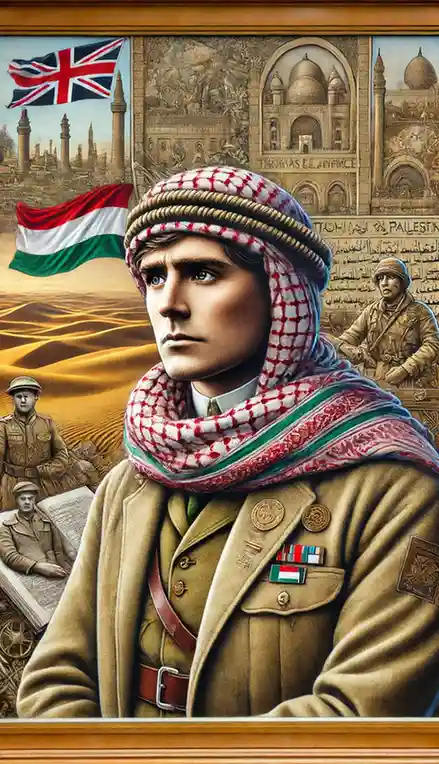Thomas Edward Lawrence, better known as T.E. Lawrence or the mythologized Lawrence of Arabia, remains one of the most enigmatic figures of the 20th century. He played a pivotal role in the Arab Revolt during World War I in this time of adventure and daring. Though poorly armed and trained, Lawrence turned the Arab tribes into a force to be recommended with. Lucky for us, records of his adventures remain accessible through his letters.
Hero of Arabia
Although all the great powers entered WWI with the expectation that it would be a short war marked by swift movements and decisive battles, they were bitterly disappointed. Instead of movement and action, they were reduced to months of misery and exhaustion in the trenches of the Western Front.

This was only made worse as the war grew larger with powers such as the Ottoman Empire joining the war. To break the deadlock or at least find some success elsewhere, the British sought to open new fronts where they could get back to the fast-paced warfare they were used to.
One of these fronts was the Arabian Peninsula. Although populated by local Arabs, the land was ruled with an iron fist by the Ottoman Empire. Although once welcomed by rulers, by the time of WWI, the people had grown resentful and wanted to break free from the Ottomans.
To that end, the British sent T.E. Lawrence to negotiate and assist the Arab tribes in their revolt. With him as a liaison, the British would send weapons and supplies while Lawrence would turn them into an effective fighting force.
However, even with this support, it was clear that the Arab tribes were now equipped to take on the professional Ottoman military. Instead, T.E. Lawrence relied on guerilla warfare, ambushing convoys, destroying bridges, and sabotaging supply lines. This turned them into an army of shadows, appearing out of nowhere and disappearing before the Ottomans could catch them.
This war proved to be immensely successful, allowing the Arabs to weaken the Ottoman defenses and tie down thousands of soldiers so that when the main British army attacked Egypt and Kuwait, the Ottomans could not hold them back and were defeated, marking them as one of the First Central powers to be defeated.
“The last stunt was the hold up of a train. It had two locomotives, and we gutted one with an electric mine. This rather jumbled up the trucks, which were full of Turks, shooting at us. We had a Lewis, and flung bullets through the sides. So they hopped out and took cover behind an embankment, and shot at us between the wheels, at 50 yards.
“Then we tried a Stokes gun, and two beautiful shots dropped right in the middle of them. They couldn’t stand that (12 died on the spot) and bolted away to the East across a 100 yard belt of open sand into some scrub. Unfortunately for them, the Lewis covered the open stretch. The whole job took ten minutes, and they lost 70 killed, 30 wounded, 80 prisoners, and about 25 got away. Of my hundred Howeitat and two British NCO’s there was one (Arab) killed, and four (Arab) wounded.”
“The Turks then nearly cut us off as we looted the train, and I lost some baggage, and nearly myself. My loot is a superfine red Baluch prayer-rug. I hope this sounds the fun it is. The only pity is the sweat to work them up and the wild scramble while it lasts. It’s the most amateurish, Buffalo-Billy sort of performance, and the only people who do it well are the Bedouin. Only you will think it heaven, because there aren’t any returns, or orders, or superiors, or inferiors; no doctors, no accounts, no meals, and no drinks.”
– Lawrence of Arabia, British Army Officer
T.E. Lawrence: Beyond the Battlefield
T.E. Lawrence’s influence extended beyond his military achievements. His deep involvement with the Arab culture and his genuine respect for the people he fought alongside earned him a unique place in their history. Lawrence was not just a military advisor but also a cultural bridge between the British and the Arabs. His efforts in documenting his experiences through his letters and writings, such as the famous “Seven Pillars of Wisdom,” provide invaluable insights into the dynamics of the Arab Revolt and the broader Middle Eastern geopolitics of the time.
The legacy of T.E. Lawrence continues to be felt today. His strategies in asymmetric warfare have been studied extensively by military historians and strategists. The Arab Revolt, with Lawrence’s guidance, played a crucial role in reshaping the Middle East. The defeat of the Ottoman Empire led to significant political changes in the region, eventually contributing to the formation of several modern Arab states. Lawrence’s vision of Arab independence, although not fully realized in his lifetime, laid the groundwork for future movements toward self-determination.
Lawrence of Arabia Letters Importance
The letters of T.E. Lawrence are not just historical documents; they are windows into the mind of a remarkable individual who navigated the complexities of war, culture, and diplomacy with exceptional skill. His correspondence reveals his thoughts on strategy, his admiration for the Arab people, and his frustrations with the political limitations of his time. These letters are invaluable resources for historians and enthusiasts alike, offering a personal perspective on one of the most tumultuous periods in modern history.
This war proved to be immensely successful, allowing the Arabs to weaken the Ottoman defenses and tie down thousands of soldiers so that when the main British army attacked Egypt and Kuwait, the Ottomans could not hold them back and were defeated, marking them as one of the first Central powers to be defeated.
If you want to create vintage letters that look fit for the queen, our Vintage Letter platform can let you create some beautiful letters that you can try here.
